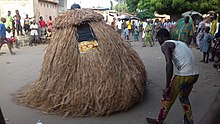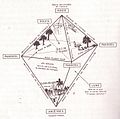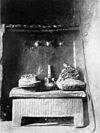Portal:Traditional African religions: Difference between revisions
-ws |
rw: {{Box-footer|'''More selected articles...'''}} |
||
| Line 18: | Line 18: | ||
{{Portal:Traditional African religions/box-header2|''Selected article''|Portal:Traditional African religions/Selected article}} |
{{Portal:Traditional African religions/box-header2|''Selected article''|Portal:Traditional African religions/Selected article}} |
||
{{Transclude random subpage|max=23|subpage=Selected article|seed=23}} |
{{Transclude random subpage|max=23|subpage=Selected article|seed=23}} |
||
{{Box-footer|'''[[Portal:Traditional African religions/Selected article|More selected articles...]]'''}} |
|||
{{Box-footer}} |
|||
{{Portal:Traditional African religions/box-header2|''Selected biography''|Portal:Traditional African religions/Selected biography}} |
{{Portal:Traditional African religions/box-header2|''Selected biography''|Portal:Traditional African religions/Selected biography}} |
||
Revision as of 10:09, 12 July 2019
| This portal is being considered for deletion in accordance with Wikipedia's deletion policy.
Please discuss the matter at this page's entry on the Miscellany for deletion page. You are welcome to edit this page, but please do not blank, merge, or move it, or remove this notice, while the discussion is in progress. For more information, see the Guide to deletion. |
Introduction The beliefs and practices of African people are highly diverse, and include various ethnic religions. Generally, these traditions are oral rather than scriptural and are passed down from one generation to another through folk tales, songs, and festivals, and include beliefs in spirits and higher and lower gods, sometimes including a supreme being, as well as the veneration of the dead, and use of magic and traditional African medicine. Most religions can be described as animistic with various polytheistic and pantheistic aspects. The role of humanity is generally seen as one of harmonizing nature with the supernatural. Unlike Abrahamic religions, African traditional religions are not idealisations, and they seek to come to terms with reality as it is. They generally seek to explain the reality of personal experience by spiritual forces which underpin orderly group life, contrasted by those that threaten it. (Full article...) Selected articleThe Ancient Egyptian religion was a complex system of polytheistic beliefs and rituals that formed an integral part of ancient Egyptian society. It centered on the Egyptians' interaction with many deities believed to be present in, and in control of, the world. Rituals such as prayer and offerings were provided to the gods to gain their favor. Formal religious practice centered on the pharaoh, the rulers of Egypt, believed to possess a divine power by virtue of their position. They acted as intermediaries between their people and the gods, and were obligated to sustain the gods through rituals and offerings so that they could maintain Ma'at, the order of the cosmos. The state dedicated enormous resources to Egyptian rituals and to the construction of the temples. Selected biographyMolefi Kete Asante, (born Arthur Lee Smith Jr.; August 14, 1942) is an African-American professor and philosopher. He is a leading figure in the fields of African-American studies, African studies and communication studies. He is currently (as of 2019) professor in the Department of Africology at Temple University, where he founded the PhD program in African-American Studies. He is president of the Molefi Kete Asante Institute for Afrocentric Studies. Selected imagesFestivalsThere are several religious festivals found in the various Traditional African religions. Some of these are listed below next to their corresponding religion :
Did you know
Selected quote
Related portalsWikiProjectsTopicsFor more Traditional African religion topics, see Category:Traditional African religions.
Things you can doAssociated WikimediaThe following Wikimedia Foundation sister projects provide more on this subject:
Discover Wikipedia using portals |



































